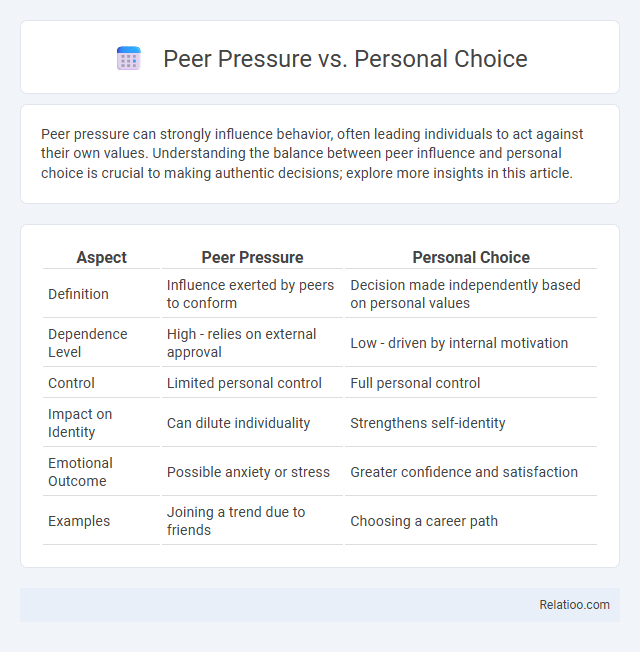Peer pressure can strongly influence behavior, often leading individuals to act against their own values. Understanding the balance between peer influence and personal choice is crucial to making authentic decisions; explore more insights in this article.
Table of Comparison
| Aspect | Peer Pressure | Personal Choice |
|---|---|---|
| Definition | Influence exerted by peers to conform | Decision made independently based on personal values |
| Dependence Level | High - relies on external approval | Low - driven by internal motivation |
| Control | Limited personal control | Full personal control |
| Impact on Identity | Can dilute individuality | Strengthens self-identity |
| Emotional Outcome | Possible anxiety or stress | Greater confidence and satisfaction |
| Examples | Joining a trend due to friends | Choosing a career path |
Understanding Peer Pressure: Definition and Types
Peer pressure involves social influences that compel individuals to conform to group norms or behaviors, often categorized into positive, negative, and neutral types. Understanding peer pressure requires distinguishing between direct pressure, such as explicit encouragement or coercion, and indirect pressure, which arises from perceived expectations or social comparison. Recognizing these types aids in differentiating peer pressure from personal choice, where decisions stem from individual values and autonomy rather than external social forces.
The Power of Personal Choice
The power of personal choice outweighs the influence of peer pressure by empowering you to make decisions aligned with your values and goals. While peer pressure can shape behavior through social expectations, personal choice fosters autonomy and resilience, enabling you to resist negative influences. Developing strong self-awareness and confidence strengthens your ability to prioritize personal values over conformity.
How Peer Pressure Influences Decision-Making
Peer pressure significantly influences decision-making by shaping your perceptions of social norms and acceptable behavior within your peer group. The desire for acceptance often leads individuals to conform, sometimes overriding personal values and autonomous choices. Understanding this dynamic is crucial for maintaining a balance between social influences and genuine personal decisions.
Benefits and Risks of Following the Crowd
Following the crowd offers social acceptance and a sense of belonging, boosting Your confidence in group settings. However, peer pressure can lead to compromised personal values and risky behaviors, increasing the chance of negative consequences. Balancing peer influence with personal choice ensures healthier decisions and strengthens Your individual identity.
Personal Choice: Building Self-Identity
Personal choice plays a crucial role in building self-identity by allowing you to make decisions that reflect your true values and beliefs rather than conforming to peer pressure. Embracing personal choice strengthens your confidence and fosters authentic self-expression, essential components in developing a strong sense of individuality. Prioritizing your own preferences over external influences supports mental resilience and long-term personal growth.
Social Dynamics: Conformity vs Individuality
Social dynamics navigate the tension between peer pressure and personal choice, where conformity often challenges individuality. You balance societal expectations with your own values, shaping identity through decisions influenced by group norms or personal beliefs. Understanding these forces helps maintain authenticity while engaging in social environments.
Managing Peer Pressure in Everyday Life
Managing peer pressure in everyday life requires recognizing when your personal choices align with or differ from those of your social group. Developing strong self-awareness and assertiveness allows you to make decisions based on your values rather than succumbing to external influences. You can maintain your individuality and foster healthier relationships by setting boundaries and seeking support from like-minded peers.
Strategies to Strengthen Personal Choices
Strengthening your personal choices against peer pressure requires clear goal-setting and self-awareness, which help you recognize your values and priorities. Developing assertiveness skills and practicing decision-making in diverse situations empower you to maintain your stance with confidence. Surrounding yourself with supportive individuals who respect your choices enhances resilience against negative influences and reinforces your autonomy.
Real-Life Examples: Peer Pressure vs Personal Choice
Teenagers face peer pressure in situations like smoking or cheating, where group influence often challenges individual values. Personal choice becomes evident when individuals refuse to engage in risky behavior despite social demands, such as a student choosing honesty over copying homework. Real-life examples include athletes resisting doping despite team encouragement and youths declining alcohol at parties, highlighting the conflict between social conformity and personal ethics.
Nurturing a Balance: Healthy Social Interactions
Nurturing a balance between peer pressure and personal choice involves fostering self-awareness and resilience in social settings, enabling individuals to make decisions aligned with their values while maintaining social connections. Encouraging open communication and critical thinking helps mitigate negative peer influences by promoting autonomy and confident decision-making. Creating supportive environments where diverse opinions are respected enhances healthy social interactions and personal growth.

Infographic: Peer pressure vs Personal choice
 relatioo.com
relatioo.com